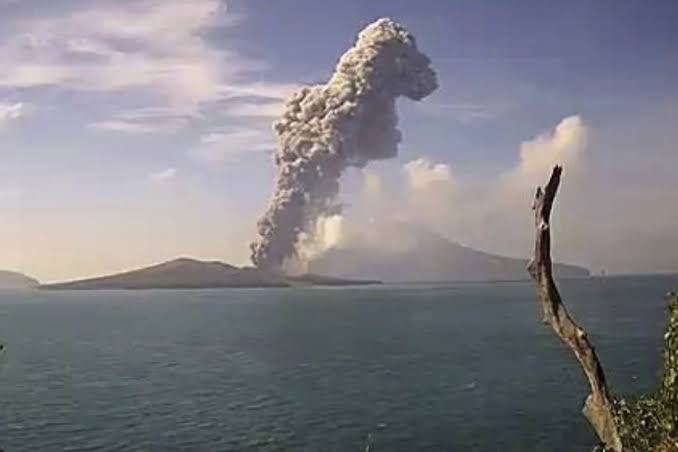Indonesia’s Anak Krakatau volcano spews ash, lava in new eruption

Anak Krakatau volcano on Sunda Strait, Indonesia releases volcanic materials into the air as it erupts on June 9, 2023.
Indonesia’s Anak Krakatau volcano has erupted, spewing ash as high as 3 kilometers (2 miles) into the air, officials said Saturday.
The volcano island located in Indonesia’s Sunda Strait between the main Java and Sumatra islands has erupted at least seven times since late Friday, Indonesia’s Volcanology and Geological Hazard Mitigation Center said.
It was the longest eruption since the explosive collapse of the mountain caused a deadly tsunami in 2018 along the coasts of Java and Sumatra, the center said. There were no casualties reported in the latest eruption and no evacuation order was issued. The nearest settlement is 16 1/2 kilometers (10 1/2 miles) away.
The center’s closed-circuit camera showed lava flares and the volcano continuously erupting until Saturday morning.
The second-highest alert on a scale of four has remained in place since 2018. Authorities in May warned residents and tourists to stay 5 kilometers (3 miles) from the crater. Up till then, people used to trek to the top to observe the nature’s spectacle.
Scientists at the center said that since the 2018 eruption and collapse, Anak Krakatau island is now only about a quarter of its original size.
A 2019 study by the center shed light on the power of the tsunami that crashed into more than 300 kilometers (186 miles) of coastline in Sumatra and Java. More than 430 people died in the waves that were 2 meters (6.6 feet) or higher and 40,000 were displaced.
The center said that the peak of the crater was 159 meters (520 feet) high, compared to 338 meters (1,108 feet) before the December 2018 eruption.
Anak Krakatau, which means “child of Kratakau,” is the offspring of the famous Krakatau, whose monumental eruption in 1883 triggered a period of global cooling.




